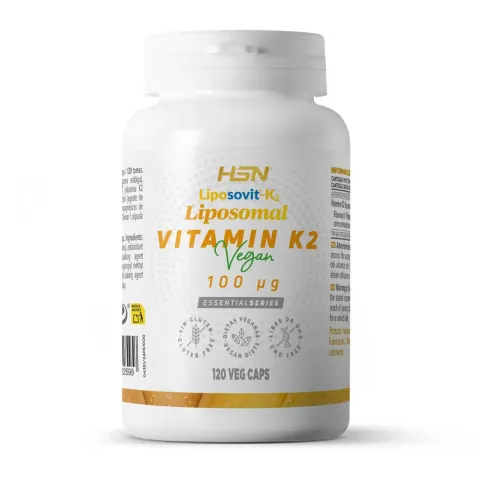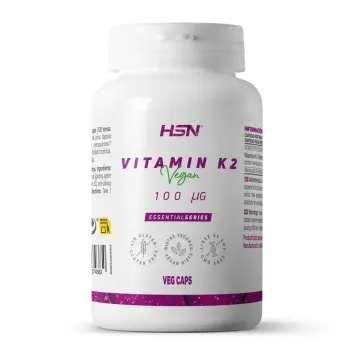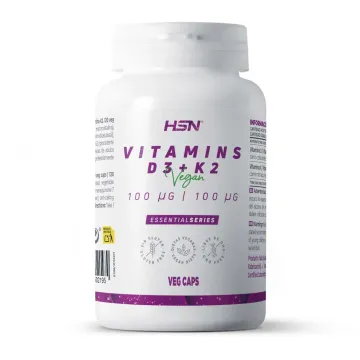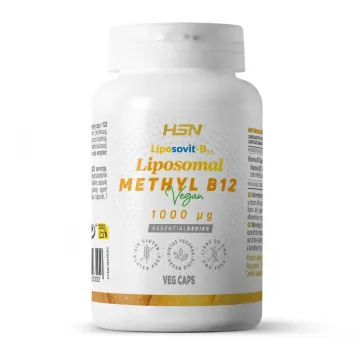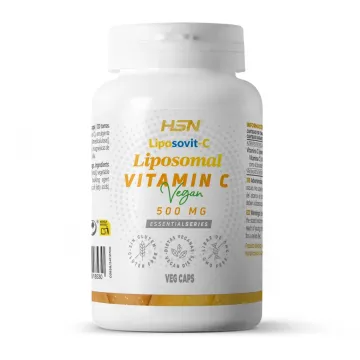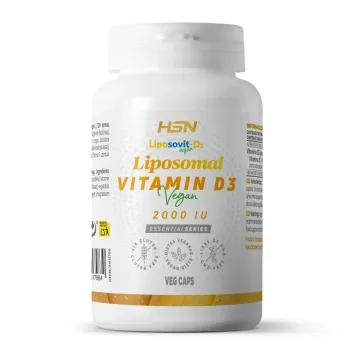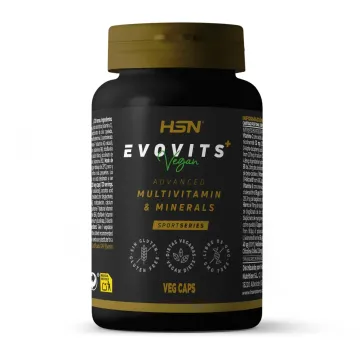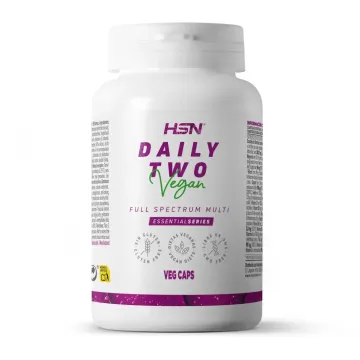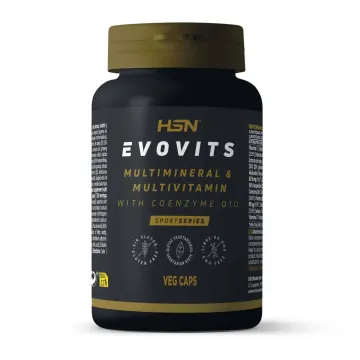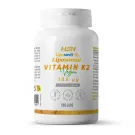- Liposomal Vitamin K2 - Enjoy the best natural vitamin K in a protected form.
- Vitamin K2 (menaquinone) - MK7 (7 carbons in length) - Authentic natural K2-MK7.
- Essential vitamin for bone health and blood clotting.
- 100mcg of natural vitamin K - 285.7mg of liposomal vitamin K.
- With the best patent in the world for liposomal nutrients: Liposovit® K2.
- Intact liposomes - Vesicular wall integrity - No degradation, 100% guaranteed protection.
Liposomal Natural K2-MK7 Vitamin
Liposomal Vitamin K2 (Liposovit®) (100mcg Vitamin K2) from EssentialSeries is a dietary supplement in vegetable capsules made from a specific form of menaquinone, as a presentation of vitamin K (subtype 2, natural), with 7 carbon lengths (MK-7 / menaquinone-7), liposomal, to protect the lipophilic affinity of the vitamin in the lipid bilayer of the vesicular walls of liposomes, thus optimising its stability and absorption.
Menaquinone-7, colloquially known as K2-MK7, is an essential vitamin for the body in any possible form of consumption, with the specific form of MK-7 being the most valued of all, the most scientifically researched, and therefore, the choice of HSN product.
Find 100mcg of pure vitamin K in each vegetable capsule of the product. Derived from several milligrams of a liposomal presentation to enjoy maximum guaranteed stability and protection thanks to the Liposovit® patent.
The best liposomal presentation of vitamin K
Liposovit®, not just any patent. Discover it!
If you still don't understand what 'liposomal' means, let us help you understand:
To liposome a nutrient, in this case, a vitamin, is a process that involves enclosing the vitamin in a closed vesicle, so it can act as a 'protective capsule' against the external environment, both in the surroundings and in the body; the vitamin, in turn, has two fractions to choose where to protect itself: an aqueous medium (ideal for water-soluble vitamins) and an interstitial space (ideal for fat-soluble vitamins, such as vitamin K2).
Bart is the name of the Polish developer responsible for creating and patenting Liposovit®, the best international raw material for liposomal nutrients, with a broad catalogue of specific vitamins. Among all the liposomal options available in the market, Liposovit® stands out for its maximum quality control.

One of the fundamental problems is that liposomisation is carried out under extreme environmental control conditions, which poses the issue that when these conditions are disrupted, for example, because the product is stored after manufacturing in a warehouse or at the user's home, the liposomes degrade, and the product loses the advantage it offers over the traditional version. This does not happen with Liposovit®.
Liposovit® controls:
- The integrity and stability of their liposomal nutrients.
- The storage temperature of their liposomal vitamins, ensuring that refrigeration is not necessary.
- The absence of animal ingredients in the preparation of their liposomes, and guarantees of absence of allergens.
Intact liposomes at room temperature, why is this important?
Liposomisation itself is not a difficult nutrient production process, but its conservation is, as they are often prepared in 'optimal' conditions, in a cold and stable environment, something that makes it very delicate if the product is not properly stored in the cold without breaking the chain, its liposomes degrade. Evidently, liposomal products requiring cold storage are very delicate, and it is common to find the problem that their liposomes break down and no longer protect the nutrients as they should.
Liposovit® is superior because the liposomes of the raw material are guaranteed to be intact at room temperature, ensuring that what you receive at your home is the highest quality liposomal vitamin, with no possibility of damage.
Liposovit® is the best alternative to other more stable and practical liposomal vitamins for conservation and use.
Vitamin K2, an important vitamin related to blood
The main sources of vitamin K2 are leafy green vegetables and fermented foods, the most representative being Natto, which is fermented soybeans; often, dietary consumption of vitamin K, unless specifically sought, is not guaranteed, making dietary supplementation with K2 an excellent option.
Vitamin K contributes to normal blood clotting and the maintenance of normal bones.
K2-MK7 form. The best!
Vitamin K can be presented as menaquinone (K2) or phylloquinone (K1). The natural form of K2 is considered superior to K1 in terms of bioavailability:
- Schurgers, L. J., Teunissen, K. J. F., Hamulyák, K., Knapen, M. H. J., Vik, H., & Vermeer, C. (2007). Vitamin K-containing dietary supplements: Comparison of synthetic vitamin K1 and natto-derived menaquinone-7. Blood, 109(8), 3279–3283.
In turn, K2 is classified into MKx, based on the number of carbons in its molecular tail, the most common being MK-4, MK-7, and MK-9; and among them, MK-7 is considered the best option as shown by scientific studies evaluating it:
Find the best liposomal vitamin K: Natural K2 | Menaquinone-7, at HSN.
Liposomal Vitamin K2 or Non-Liposomal Vitamin K2?
At HSN, we offer non-liposomal vitamin K2:
The presentation of non-liposomal vitamin K2 is effective, although considered inferior to the liposomal version. The general criterion for choosing one or the other is to determine the amount of vitamin we typically consume through diet, i.e., if we regularly include portions of leafy green vegetables like spinach in our diet, or are regular consumers of Natto, you can supplement your diet with standard Vitamin K2. If this is not the case, you can choose the liposomal version.
Combine it with Liposomal Vitamin D3!
You will not only find vitamin K2 at HSN in isolation, one of the most common combinations of vitamin K is vitamin D due to their synergistic properties on bones, and you can find them combined in products like:
As a liposomal presentation, we do not offer both vitamins in combination, but you can use liposomal Vitamin K2 along with liposomal Vitamin D3:
Vitamin D (like vitamin K) contributes to the maintenance of normal bones!
Scientific Studies
- DiNicolantonio, J. J., Bhutani, J., & O’Keefe, J. H. (2015). The health benefits of Vitamin K. Open Heart, 2(1), e000300.
- Mladěnka, P., Macáková, K., Kujovská Krčmová, L., Javorská, L., Mrštná, K., Carazo, A., … Nováková, L. (2022). Vitamin K - sources, physiological role, kinetics, deficiency, detection, therapeutic use, and toxicity. Nutrition Reviews, 80(4), 677–698.
- Shea, M. K., & Booth, S. L. (2022). Vitamin K. Advances in Nutrition, 13(1), 350–351.
- Simes, D. C., Viegas, C. S. B., Araújo, N., & Marreiros, C. (2020). Vitamin K as a diet supplement with impact in human health: Current evidence in age-related diseases. Nutrients, 12(1).
 Before
Before After
After During
During Morning
Morning Afternoon
Afternoon Night
Night








